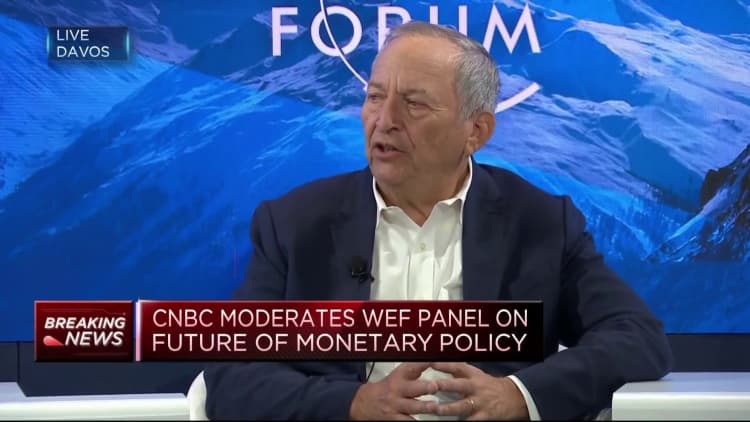Central banks not finishing what they have started in bringing inflation back to Earth would be the "greatest tragedy" for the global economy, according to former U.S. Treasury Secretary Larry Summers.
Central banks around the world have tightened monetary policy aggressively over the past year in a bid to get inflation under control, with annual consumer price increases running at multi-decade or even record highs across most major economies.
Economists are turning cautiously optimistic as recent data has suggested a slowdown in inflation, which may enable policymakers to ease and eventually stop their aggressive cycle of interest rate hikes.
Speaking on a CNBC-moderated panel at the conclusion of the World Economic Forum in Davos, Switzerland, on Friday, Summers said economists and business leaders at the summit were experiencing an "exhilaration of relief" but cautioned policymakers against resting on their laurels.
"Hyperpopulists lost elections and accepted their defeat, Europe has not frozen, recession has not come, China has adjusted its policies towards the world and inflation has decelerated. Those are all positive things and reasons why we should feel better than we felt a few months ago," Summers told CNBC's Geoff Cutmore.
"But relief must not become complacency. Inflation is down, but just as transitory factors elevated inflation earlier, transitory factors have contributed to the declines that we've seen in inflation and as in many journeys, the last part of a journey is often the hardest."
Although recent data has shown signs that inflation is entering a sustained downward trajectory, it remains well above most central banks' targets. As such, policymakers have maintained a hawkish tone despite the perceived economic risks of persistent high interest rates.

"The greatest tragedy in this moment would be if central banks were to lurch away from a focus on assuring price stability prematurely and we were to have to fight this battle twice," Summers said.
He added that he had been encouraged by recent comments from Federal Reserve Chairman Jerome Powell and European Central Bank President Christine Lagarde.
"We have to carry through, because if inflation were to be allowed to surge back, that would put not just price stability, not just standards of living for some of the lowest income people at risk, but also pose very substantial risks to cyclical stability," he said.
"At the same time, we need to remember both in our countries and around the world the importance of those who have been left behind and are bearing the greatest burden from all of these necessary adjustments. That too is going to be crucial in the years ahead."





